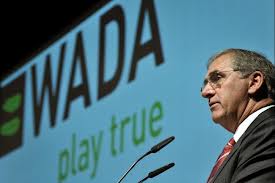By David Owen
June 27 – The World Anti-Doping Agency (WADA) will be forced to scale back its activities if Governments are not prepared to stump up more cash, chairman John Fahey (pictured) has warned. Writing in an annual report that reveals a 60%-plus advance in WADA’s annual deficit, Fahey describes limited funding as WADA’s “biggest constraint ahead”.
“For the second consecutive year, WADA’s Foundation Board voted to keep the 2013 budget frozen at approximately $28 million, the same level of funding received in 2011, because governments did not agree to provide any additional funding for WADA,” said Fahey.
“While I appreciate that economies across the world continue to struggle, this freeze is not ideal for the fight against doping in sport.
“WADA has dipped into reserves over the last two years to cover shortfalls for its operating costs, but if funding continues to remain the same the Agency will be forced to cut back its activities.
“When you consider the hundreds of billions of dollars generated globally by sport every year, and the importance sport plays in our lives and in forming young athletes’ attitudes toward doping, it continues to surprise me that there is a reluctance to properly invest in protecting it.”
He concludes: “Without appropriate funding, there can be no significant progress.”
The strongly worded message comes after a year in which the organisation’s deficit, or “excess of expenses over income”, widened from just under $476,000 in 2011 to $770,600.
This was even though currency fluctuations swung appreciably in WADA’s favour.
A finance overview contained in the report said that, while the overall financial position remained stable, cash reserves used to cover deficits were “depleting”.
It went on to warn: “Income must increase or activities be reduced for WADA to continue to meet its obligations under the World Anti-Doping Code.”
WADA’s 2011 annual report, published a year ago, had warned that “WADA’s unallocated cash reserve will not meet deficits beyond the next 30 months”.
The bulk of WADA’s income comes from the International Olympic Committee (IOC) on the one hand and public authorities/governments on the other.
This is an important year for the agency, with a new anti-doping code set to be presented to stakeholders at a conference in Johannesburg in November. The new code is due to come into effect in 2015.
Contact the writer of this story at david.owen@insideworldfootball,com

